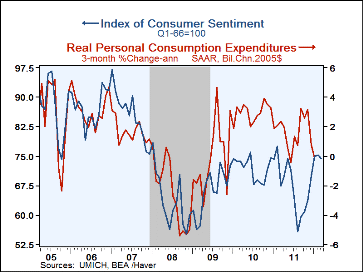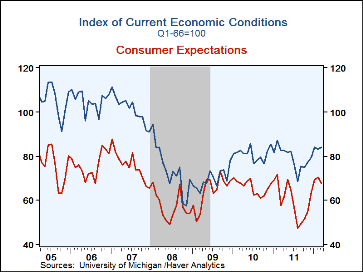 Global| Mar 16 2012
Global| Mar 16 2012U.S. Consumer Sentiment Disappoints
by:Tom Moeller
|in:Economy in Brief
Summary
The University of Michigan's Index of Consumer Sentiment for mid-March fell to 74.3 from 75.3 in February. The figure compared to expectations for improvement to 76.0. A decline in consumer expectations led this month's weakness with [...]
The University of Michigan's Index of Consumer Sentiment for mid-March fell to 74.3 from 75.3 in February. The figure compared to expectations for improvement to 76.0. A decline in consumer expectations led this month's weakness with a decline to 68.0 but that still was up 17.4% y/y. Consumers' reading of current conditions rose to 84.2 and recovered all of its February drop. During the last ten years there has been a 60% correlation between the level of sentiment and the three-month change in real personal consumption expenditures.
The Reuters/University of Michigan survey data are not seasonally adjusted. The readings are based on telephone interviews with just- over 300 households. Data are in Haver's USECON database. The expectations figure is in Haver's AS1REPNA database.
| University of Michigan (Q1'66 = 100) |
Mid-Mar | Feb | Jan | Mar Y/Y | 2011 | 2010 | 2009 |
|---|---|---|---|---|---|---|---|
| Consumer Sentiment | 74.3 | 75.3 | 75.0 | 10.1% | 67.3 | 71.8 | 66.3 |
| Current Economic Conditions | 84.2 | 83.0 | 84.2 | 2.1 | 79.1 | 80.9 | 69.6 |
| Consumer Expectations | 68.0 | 70.3 | 69.1 | 17.4 | 59.8 | 66.0 | 64.1 |
Tom Moeller
AuthorMore in Author Profile »Prior to joining Haver Analytics in 2000, Mr. Moeller worked as the Economist at Chancellor Capital Management from 1985 to 1999. There, he developed comprehensive economic forecasts and interpreted economic data for equity and fixed income portfolio managers. Also at Chancellor, Mr. Moeller worked as an equity analyst and was responsible for researching and rating companies in the economically sensitive automobile and housing industries for investment in Chancellor’s equity portfolio. Prior to joining Chancellor, Mr. Moeller was an Economist at Citibank from 1979 to 1984. He also analyzed pricing behavior in the metals industry for the Council on Wage and Price Stability in Washington, D.C. In 1999, Mr. Moeller received the award for most accurate forecast from the Forecasters' Club of New York. From 1990 to 1992 he was President of the New York Association for Business Economists. Mr. Moeller earned an M.B.A. in Finance from Fordham University, where he graduated in 1987. He holds a Bachelor of Arts in Economics from George Washington University.
More Economy in Brief
 Global| Feb 05 2026
Global| Feb 05 2026Charts of the Week: Balanced Policy, Resilient Data and AI Narratives
by:Andrew Cates








